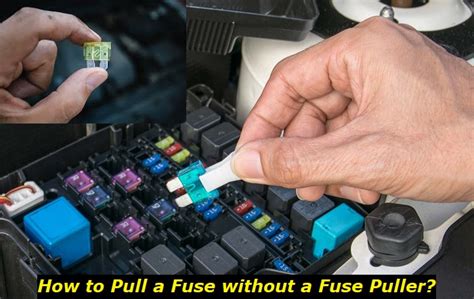How To Pull A Fuse Out Without A Fuse Puller
Ronan Farrow
Apr 02, 2025 · 3 min read

Table of Contents
How to Pull a Fuse Out Without a Fuse Puller
Pulling a fuse can be tricky, especially when you don't have the right tools. A fuse puller makes the job simple, but if you find yourself in a situation without one, don't worry! There are several safe and effective ways to remove a fuse without a specialized tool. This guide will walk you through the process, ensuring you do it safely and efficiently.
Understanding Fuse Types and Safety Precautions
Before we begin, it's crucial to understand that electricity is dangerous. Always turn off the power at the breaker box before attempting to remove any fuse. This crucial step protects you from potential electric shock. Familiarize yourself with your fuse box and the location of the main power switch.
Different fuses have different designs. You might encounter:
- Standard Fuses: These are usually glass or ceramic tubes with metal ends.
- Cartridge Fuses: These are cylindrical fuses with metal caps.
- Blade Fuses: These are flat fuses with metal blades on each end.
Methods for Removing Fuses Without a Fuse Puller
Once the power is off, you can choose one of these methods to remove the fuse:
Method 1: Using Needle-Nose Pliers
Needle-nose pliers provide excellent grip and precision. Gently grasp the metal ends of the fuse (avoiding the glass or ceramic body for glass fuses) with the pliers. Slowly and carefully pull the fuse straight out. Avoid jerking or twisting.
- Caution: Be gentle to avoid damaging the fuse or the fuse holder.
Method 2: Using Insulated Screwdriver and Pliers
If the fuse is stubborn, you can use a combination of tools. Insert a small, insulated screwdriver into the fuse holder to slightly loosen it. Then, use needle-nose pliers or even your fingers (if you're comfortable) to carefully pull the fuse free.
- Caution: Again, avoid using excessive force. If it's too difficult, reassess your approach.
Method 3: Using a Small Flat-Head Screwdriver (For Blade Fuses Only)
For blade fuses, a small flat-head screwdriver can be used. Carefully insert the screwdriver into the slot where the fuse fits into the holder, slightly levering the fuse up. Once loose, gently pull the fuse out.
- Caution: Be mindful not to damage the fuse holder's contacts.
After Removing the Fuse
After you’ve successfully removed the fuse, inspect it for damage. A blown fuse will typically show a broken filament or a melted metal link. Replace the fuse with a fuse of the same amperage rating. Never replace a fuse with a higher amperage fuse, as this could lead to overheating and fire hazards.
Preventing Future Fuse Removal Issues
While learning how to remove a fuse without a puller is helpful for emergencies, investing in a fuse puller is a wise choice. It's a small, inexpensive tool that makes fuse removal quick, safe, and easy, preventing any potential damage to the fuses or the fuse box.
Conclusion
Removing a fuse without a specialized tool is doable with caution and the right technique. Remember to always prioritize safety by turning off the power before attempting any repairs. By following the steps outlined above, you can safely and effectively remove fuses, even without a fuse puller. Remember to replace the fuse with the correct amperage.
Featured Posts
Also read the following articles
| Article Title | Date |
|---|---|
| How To Sight In A Pulsar Thermal Scope | Apr 02, 2025 |
| How To Remove Fusion Extensions | Apr 02, 2025 |
| How To Remove Toilet Limescale | Apr 02, 2025 |
| How To Strip Chrome From Plastic | Apr 02, 2025 |
| How To Replace Camper Ceiling | Apr 02, 2025 |
Latest Posts
-
How Do I Adopt My Grandchild
Apr 04, 2025
-
How Do Hotel Cards Work
Apr 04, 2025
-
How Do Horses Move Their Tails
Apr 04, 2025
-
How Do Grills Stay On Your Teeth
Apr 04, 2025
-
How Do Frogs Get To Work Joke
Apr 04, 2025
Thank you for visiting our website which covers about How To Pull A Fuse Out Without A Fuse Puller . We hope the information provided has been useful to you. Feel free to contact us if you have any questions or need further assistance. See you next time and don't miss to bookmark.
